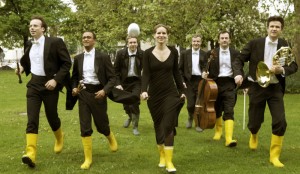Feeding the world in a changing climate
Here is the second dispatch from our reporter Carl Gierstorfer, presently filming on location in the Philippines:
"Second day shooting at the International Rice Research Institute (IRRI). Anyone talking about world food security cannot ignore IRRI's contribution. Many popular strains of rice, grown on millions of hectares, have been bred here. IRRI was founded half a century ago. But maybe its real challenges lie ahead. Until 2050 another three to four billion people need to be fed. The majority of them on rice. With less resources, an unpredictable climate, and not much more land.
Yet still, scientists here are optimistic: they think they can meet the challenges. Meet Sigrid Heuer, a German molecular biologist. She worked on a team that bred Sub-1, a strain of rice that can survive flash floods, which are expected to become more common due to climate change. Mining IRRI's seed bank, with more than 125,000 varieties, never disappoints the scientists. In the cold archives, there are long forgotten strains; rejected because they were not tasty enough, or had too little yield. But these loners might just have that special trait required in the future – like surviving underwater for two weeks. Or tolerating salty conditions. Scientists like Heuer look for these varieties; they isolate useful traits and breed them into popular strains. Sub-1 is simply Asia's most favorite variety with a gene that allows it to survive heavy floods.
IRRI is a little world in itself. More than 800 people work here; buildings and fields are spread out over a wide area; a settlement with its own fire fighters and strange 1950s architecture. I had a stroll around at night – have a look at the pictures. And, yes, alcohol is forbidden here. Some of IRRI's founders apparently were Quakers…"

Orchestra of Change – Classical music with a green conscience
 Markus Bruggaier is a man on a mission. As a horn player with Berlin's Staatskapelle, one of Europe's great orchestras, he makes a living from catering for the refined tastes of others. In concerts every other night of the week. Like all art, it comes at a price. But particularly in music it's more than just the cost of a ticket. The makers of musical instruments require hard woods, much of which still come from sources that are at best questionable, he says.
Markus Bruggaier is a man on a mission. As a horn player with Berlin's Staatskapelle, one of Europe's great orchestras, he makes a living from catering for the refined tastes of others. In concerts every other night of the week. Like all art, it comes at a price. But particularly in music it's more than just the cost of a ticket. The makers of musical instruments require hard woods, much of which still come from sources that are at best questionable, he says.
"In Madagascar dozens of hectares of rosewood trees are logged every day. Much of it goes to China but also the US and other countries – e.g. to produce guitars. Some 10 million are made every year."
In addition, while the issue of climate change in general has started to inform a lot of the activities of artists in other areas, classical musicians in particular have remained a little too aloof from it, in Bruggaier's view. An unacceptable state of affairs, thought Bruggaier and a handful of colleagues of the Staatskapelle. In autumn of 2009 they decided to put the issue on the agenda of their orchestra and convinced most of their fellow musicians of the need to do something. The result is the Orchester des Wandels – the Orchestra of Change.
 Last Sunday they played their first concert in 2011 with all proceeds pledged to go to WWF forest conservation projects in India's Himalayan Northern states of Sikkim and Arunachal Pradesh. All musicians put in their free time to play the concert – including world renowned conductor Zubin Mehta. Hailing from India himself, the maestro said, he was moved to tears, when the orchestra first approached him about playing the concert.
Last Sunday they played their first concert in 2011 with all proceeds pledged to go to WWF forest conservation projects in India's Himalayan Northern states of Sikkim and Arunachal Pradesh. All musicians put in their free time to play the concert – including world renowned conductor Zubin Mehta. Hailing from India himself, the maestro said, he was moved to tears, when the orchestra first approached him about playing the concert.
The orchestra welcome donations for their efforts and invite other musicians and orchestras to join.
Watch their kick-off concert last year. A truly elevating experience – literally, just watch to the end:
Read more about the Orchester des Wandels here.
Green Call: Angella Katatumba wants to stir up the youth
Angella Katatumba is the International climate change icon in Uganda, appointed by the British Council. The idea of the song and the appointment of course is to make climate change an exciting topic to the young people.
Here's a short interview with Angella featured at the Pied Magazine, an african eco online mag.
More detailed informations are available at musicuganda.com, a pretty interesting website that claims to be Ugandas leading music and entertainment website.
Sustainable Rice production in the Philippines – Day 1
Our reporter Carl Gierstorfer has just started filming in the Philippines for one of our upcoming reports. Here is his first dispatch:
"First day filming at the International Rice Research Institute (IRRI) south of Manila. How could rice be possibly interesting? Well, it's mankind's most important crop. The main source of carbohydrates for more than half the world's population. Employer, source of income, pillar of urban settlements. Rice has been farmed for thousands of years, different varieties bred and selected. What's common to all is that they need a lot of water. And therein lies the problem. Climate change will make water supplies very unpredictable. What's more: when rice paddies are flooded with water they emit methane, a powerful greenhous gas. In rice producing countries like Thailand, China, the Philippines this means lots and lots of it. Rice, the staple of billions also contributes to global warming.
How to change this? How to make rice both climate friendly and resistant to climate change ? People here at IRRI have some very smart ideas. Stay tuned."
Recycling in Bali – day 4: Tradition hard-pressed for answers
While shooting for our report about the garbage problem on the island of Bali, we were invited to attend a traditional Hindu dance ceremony in a little village temple. In Bali, Hinduism is blended with a very old religions entrenched in nature. Traditionally, people in the village used to live in balance with nature, like using banana-leafs to package or wrap food.
The dance in the video is a "flirting" dance. It's a way for the children to learn the rules and how to behave. But the traditional rules don't have an answer to the garbage problem. Many people dispose of their rubbish by just throwing it away, because they don't know what else to do. What they told me is, they see the problem and they wait for solutions.
(For those of you keen on finding out what our reporter looks like, check out the video at 1mins08secs.)








Feedback